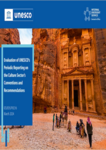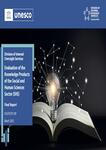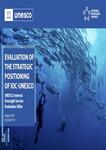Page Header

Downloads:
2
Evaluation of the future of UNESCO’s Education Sector: the Normative vs Operational Role in the Context of Agenda 2030
Overview
This evaluation examines whether UNESCO has achieved an effective strategic positioning and sustainable balance between its global and regional coordination, intellectual leadership and standard-setting roles, on the one hand, and its country-level operational roles on the other. In doing so, it considers the interrelationship between these roles, and opportunities for strengthening the overall functioning of the Education Sector. The evaluation revealed that the foundations of UNESCO’s comparative advantage are strong, however a rapidly evolving global education architecture, compounded by a period of significant and sustained financial and capacity constraint have affected the Sector’s capacity to ensure its continued relevance. Moreover, UNESCO played a leading role in shaping the SDG4-Education 2030 Agenda but momentum has slowed in the post-2015 implementation period. This points to a need to rebalance the Education Sector’s global, regional and operational roles, with a particular need to strengthen global and regional coordination of SDG4. The evaluation includes six interlinked recommendations for how to strengthen the operation of the Education Sector to ensure it remains fit for the futureReport Details
| Year Published | |
| Type | |
| Theme/s | |
| Joint | No |
| Partner/s | N/A |
| SDG/s | |
| Consultant name | |
| Agency Focal Point | Claudia Ibarguen |
| Focal Point Email | c.ibarguen@unesco.org |
| Managed by Independent Evaluation Office | Yes |
| Geographic Scope | Global |
YOU 'RE READING
Evaluation of the future of UNESCO’s Education Sector: the Normative vs Operational Role in the Context of Agenda 2030










